At a book-lovers’ mecca, a celebration of illuminated manuscripts from the Jewish Diaspora
On the left side of the ground-floor gallery at the Upper East Side’s Grolier Club — an institution that bills itself as “America’s oldest and largest society for bibliophiles” — you’ll find elaborately decorated, centuries-old Jewish manuscripts from the likes of Italy, France and the Iberian Peninsula.
On the right, there’s a similar assortment of manuscripts, also organized geographically. These manuscripts are remnants of dynamic Jewish communities that once existed in Muslim lands such as Yemen, North African and Iran/Iraq.
Collectively, these works form “Jewish Worlds Illuminated: A Treasury of Hebrew Manuscripts from The JTS Library,” the first-ever exhibition dedicated to Jewish books and manuscripts at the storied club, which was founded in New York City in 1884.
On view through Dec. 27, the free exhibit is also the largest exhibition to date curated by the library of the Jewish Theological Seminary, which is home to one of the world’s largest collections of Hebrew manuscripts and printed materials. Among the 100 objects on view are documents that date as far back as the 12th century.
The elaborately decorated works on display comprise a wide assortment of texts, such as prayer books, Passover haggadahs and ketubahs or Jewish marriage contracts. Most of them are written in Hebrew. But there are some stark differences between the two sides of the gallery: Human forms are plentiful in the manuscripts from Europe, for example, while works created by Jews in Muslim lands typically reflect the Islamic art style, with elaborate patterns, floral motifs and very few depictions of people.
“Jews adopted and adapted the art of the country in which they lived,” Sharon Lieberman Mintz, curator of Jewish art at the JTS library, explained during a private tour. “When Jews were living in Islamic lands, they eschewed figural arts. There may have been a bird or two here and there, but not humans, with rare exception.”
Examples like these spotlight the ways Jews lived their lives throughout years of diaspora, and how they integrated themselves within their culture of residence.
“If you look at the outstanding works in our collection — manuscripts in particular, but not just manuscripts — [they] reflect the geographical distribution that you see here,” said David Kraemer, the Joseph J. and Dora Abbell librarian and professor of Talmud and Rabbinics at JTS. “It is notable, but not intentional, that we don’t have material here from the land of Israel.”
Kraemer continued: “What that means is that during the ages that these works were being produced, and from which they survive, this is where Jews lived,” he said. “Very, very few Jews lived in the land of Israel, and there was very little production of this kind of material in the land of Israel.”

Left: Abraham Judah ben Yehiel of Camerino’s “Rothschild Mahzor,” from Florence, Italy in 1490. Right: A page from “Sermons and Collected Teachings,” from 17th-century Salonica, Greece. (Courtesy the Library of the Jewish Theological Seminary).
Instead, the exhibit is filled with treasures from across the centuries and around the globe, including handwritten letters from the physician, rabbi, philosopher and author Moses ben Maimon — aka Maimonides. One such letter, penned in 1170 by Maimonides’ personal secretary, Mevorakh ben Nathan, is signed by the sage himself. It pleads for funds to ransom the Jews who were taken prisoner in November 1168 when the crusader king Amalric I of Jerusalem conquered the Egyptian city of Bilbeis, some 50 miles north of Cairo, which was home to a sizable Jewish community in the Middle Ages.
“So much of what happens, Jewishly, in North America is Ashkenazi-centric, which misrepresents Jewish life and history around the world,” Kraemer said. “When Ashkenaz was barely a blip, the vast majority of the world’s Jews lived in Muslim lands.”
The exhibit makes it plain just how embedded Jews were into the countries in which they lived. In the Italy section, there’s a page displayed from the Rothschild Machzor, a prayer book written by master scribe Abraham Judah ben Yehiel in Florence in 1490. An illustration depicts the children of Israel receiving the Ten Commandments as they’re decked out in the Florentine fashions of the time — with the receding hairline that was all the rage in during the Renaissance.
“When you look at these materials, you can’t just think of Jews as separated and isolated and ghettos and oppressed and all that kind of stuff,” Kraemer said. “That’s not what the story here is.”
Instead, the exhibit spotlights how Jewish communities reflected broader cultural trends, including fashion and art.
Just don’t ask the curators to select their favorites. Kraemer and Liberman Mintz both blanched when asked to choose three or four standout items in the gallery. Instead, we settled on finding particularly unusual works on display.
“The answer changes every five minutes,” Kraemer explained.
As an example, Kraemer points to a 17th-century manuscript from Salonica, Greece that he describes as “absolutely wonderful in its outrageous combination.” The page, from a collection of sermons and teachings, is a scholarly theological discussion — specifically, about how Moses, who was flesh and blood, was able to ascend to the realm of God, who is pure spirit. By contrast, the illustrations on the page — animals, birds and flowers — seem like something from a children’s book.
“Don’t we all somehow have those sensibilities built into us?” Kraemer mused. “We can be very, very sophisticated and very, very simple and childlike at the same time.”
All told, the exhibit, said Kraemer, is meant to challenge misconceptions about how Jews lived their lives during centuries of diaspora life.
“We have a lot of conceptions of what Jewish life was through the ages,” Kraemer said. “When one witnesses these materials — their splendor, their creativity, their embeddedness within the local culture, their languages, the visual language, all of that — it tells us that Jews and their neighbors were part of the same world.”
“In a world which has a very black and white vision of Jewish life and the relationship of Jewish life to the host cultures, this brings color to it,” Kraemer continued. “It wasn’t black and white. I mean both literally and figuratively — this brings color to the fullness of Jewish experience.”
“Jewish Worlds Illuminated: A Treasury of Hebrew Manuscripts from The JTS Library” is on view at The Grolier Club (47 East 60th St.) through Dec. 27. For more information, click here; to book a tour (highly recommended!) click here.
Rabbi Moshe Hauer, OU leader admired across Jewish world, is dead at 60
American Jewry is reeling following the sudden death of Rabbi Moshe Hauer, the executive vice president of the Orthodox Union who was widely known and admired across denominations.
Hauer, the O.U.’s public face since 2020, died of a heart attack at his Baltimore home on Tuesday, the holiday of Shemini Atzeret. He was 60. His death was not announced until Wednesday night, the end of the Simchat Torah holiday.
“Rabbi Hauer was a true talmid chacham, a master teacher and communicator, the voice of Torah to the Orthodox community and the voice of Orthodoxy to the world,” the Orthodox Union said in a statement announcing his death. “He personified what it means to be a Torah Jew and took nothing more seriously than his role of sharing the joy of Jewish life with our community and beyond.”
A levaya, or funeral service, took place Thursday morning at Baltimore’s Bnai Jacob Shaarei Zion Congregation, the Orthodox congregation Hauer led for 26 years before taking the O.U. position five years ago.
“You taught us with such clarity, you taught us with such force, with such conviction, you taught us who you want us to be,” said Rabbi Daniel Rose, Hauer’s successor at the synagogue, in a speech he said was short because Hauer’s body and family were due on a flight to Israel for his burial. Pausing to cry, he went on, “I can’t ask you anymore. I think you taught us well enough that we don’t need to ask you.”
Hauer was an exemplar of Modern Orthodoxy’s historical blend of religious and secular expertise. After being ordained at Ner Israel, an Orthodox yeshiva in Baltimore, he earned a master’s degree in engineering from Johns Hopkins University. He was the founding editor of Klal Perspectives, an online journal elevating Orthodox perspectives on contemporary issues.
In 2023, Hauer testified about antisemitism on American college campuses at a hearing of the House Committee on Education and the Workforce. The hearing prompted investigations of several universities for allegedly failing to protect students from antisemitic harassment.
Sen. Josh Hawley, the Missouri Republican who in 2023 worked with the O.U. to pass a Senate resolution condemning Hamas and campus antisemitism, issued a statement saying he was “deeply grieved by the death of my friend.”
Hawley said: “His sudden death is a tremendous loss to America and to friends of Israel everywhere. Rabbi Moshe was a man of remarkable integrity and kindness, and also foresighted leadership. He was a true and dear friend to me.”
Hauer also sometimes was required to speak hard truths to his community. In 2020, he met with Anthony Fauci, then director of the National Institute of Allergy and Infectious Diseases, in forming the O.U.’s response to the COVID-19 pandemic. Hauer then urged congregations to exceed the government’s reopening guidelines. In 2023, he denounced a rampage by Jewish settlers in the West Bank, saying, “We cannot understand or accept this.”
A wide array of Jewish voices mourned Hauer and expressed shock at his sudden death.
“We just spoke this past Friday and texted on Monday, when he was overflowing with joy at the miracle of the hostages’ freedom and the unmistakable hand of Hashem in it,” tweeted William Daroff, president of the Council of Presidents of Major American Jewish Organizations. “Rabbi Hauer was a trusted advisor, cherished colleague, and wise counselor to me, a bridge-builder whose faith, humility, and moral clarity inspired all who knew him. His loss leaves a deep void for all who loved and learned from him.”
Rabbi Shlomo Peles of the Jewish Relief Network Ukraine, a Chabad organization, praised Hauer’s willingness to work with his movement.
“Rabbi Hauer constantly mobilized on behalf of the Rebbe’s Shluchim [emissaries], and especially for those in Ukraine,” Peles said in a statement. “Rabbi Hauer acted with genuine care, a broad heart, and a shining countenance.”
“Klal Yisroel has lost a leader who was universally respected as a talmid chochom of stature, a man of integrity, humility, vision, wisdom and depth,” Agudath Israel, an advocacy group representing haredi, or ultra-Orthodox, Jews, said in a statement. “Rabbi Hauer created Kiddush Hashem in all of his encounters with the outside world, and he leaves behind an impressive list of significant accomplishments. The loss to our community is incalculable.”
“The Jewish people has lost a sage,” said Rabbi Rick Jacobs, president of the Union for Reform Judaism, in a Facebook post that included a photograph of himself sitting with Hauer in the official residence of Israeli President Isaac Herzog during a communal mission in July.
Jacobs recalled that Herzog had noted with some surprise that the president of the Reform movement was sitting next to a leader of the Orthodox Union. “I told President Herzog that it was completely natural for me to sit next to my friend and cherished colleague,” he wrote. “Yes, we disagreed on so many issues but shared a profound respect and love for one another. …. Rabbi Hauer’s humble leadership helped point the way for a more respectful and mutually responsible future for the Jewish people grounded in Torah.”

Rabbi Moshe Hauer, left, meets with Israeli President Isaac Herzog at Herzog’s official residence in Jerusalem, Jan. 22, 2025. (Orthodox Union)
When he was tapped as its new executive vice president in 2020, succeeding Allen Fagin, Hauer pledged to address the rising costs of the Orthodox lifestyle — the O.U. supports federal “school choice” policies in order to offset the high costs of day school tuition — and expressed his commitment to Modern Orthodoxy, which in contrast to haredi Judaism seeks to balance a strict adherence to Jewish law, or halacha, with a deeper engagement with modernity.
“Our community expresses this commitment by engaging with the world around us, as well as with all members of Klal Yisrael and by addressing every modern issue and contemporary challenge from within the value system of Torah,” he told the New York Jewish Week at the time. “We undertake all of these responsibilities while also completely dedicating ourselves to a growing engagement in Torah study, prayer and halachic observance.”
To that point, he added, the O.U. “is completely committed to maximizing — within the framework of halacha — the engagement of Jewish women in every aspect of Jewish life. This is an organizational and communal priority.”
Sheila Katz, CEO of the National Council of Jewish Women, wrote in a Facebook post on Wednesday night that she had been so shocked to hear of her friend’s death that she texted him hoping that it was not true. She said she had just spoken to him last week, in the latest installment of an ongoing conversation that transcended their differences.
“Our very different realities came up over and over again. I loved learning how he lived his life, and he seemed to love learning how I lived mine. Difference, but mutual respect, was at the core of our deep friendship,” Katz wrote.
In the Jewish Week interview, Hauer pledged to improve “relationships beyond the confines of our community.”
That was also the message of one of his last public statements, shared on Oct. 3. In it he described the upcoming Sukkot holiday as an opportunity for connection among Jews from “ideologically diverse places.”
“Even those who usually live separately must seize opportunities for contact and connection,” he said.
Hauer’s survivors include his mother, Miriam Hauer; his wife, Mindi Hauer; their sons Yissachar, Yehuda Leib and Shalom; daughters Devorah Walfish, Batsheva Neuberger, Chana Schneiweiss and Rachel Hauer, and their spouses and numerous grandchildren.
Zohran Mamdani deflects questions about Hamas on Fox News
This piece first ran as part of The Countdown, our daily newsletter rounding up all the developments in the New York City mayor’s race. Sign up here to get it in your inbox. There are 19 days to the election.
📺 Mamdani on Fox
-
Zohran Mamdani deflected questions about Hamas and Israel in a Fox News interview on Wednesday, pivoting to his campaign pledge of making New York more affordable.
-
Anchor Martha MacCallum repeatedly raised the Middle East, asking Mamdani, “Do you believe that Hamas should lay down their weapons and leave the leadership in Gaza?”
-
“I believe that any future here in New York City is one that we have to make sure that’s affordable for all,” Mamdani replied. “And as it pertains to Israel and Palestine, that we have to ensure that there is peace.”
-
When MacCallum repeated the question, Mamdani said, “I don’t really have opinions about the future of Hamas and Israel beyond the question of justice and safety, and the fact that anything has to abide by international law. And that applies to Hamas, that applies to the Israeli military.”
-
Mamdani said it was “too early” to give President Trump credit for the ceasefire between Israel and Hamas, but that he would give credit if a lasting peace was established.
-
He also spoke directly to Trump, an avid viewer of the network, with a message that blasted his rival Andrew Cuomo and offered to partner with the president on his campaign promise of affordability.
-
“I will not be a mayor like Mayor Adams, who will call you to figure out how to stay out of jail. I won’t be a disgraced governor like Andrew Cuomo, who will call you to ask how to win this election. I can do those things on my own,” said Mamdani. “I will, however, be a mayor who is ready to speak at any time to lower the cost of living.”
-
Asked about his 2020 comments on defunding the police, Mamdani issued his first broad public apology to NYPD officers during the interview. He has been privately meeting with the rank and file to apologize in recent months.
🕍 Rabbis grapple with Mamdani
-
Several rabbis have acknowledged that their institutions would benefit from a strong relationship with the next mayor, who appears increasingly likely to be Mamdani, reported The New York Times. And a smattering of liberal rabbis have praised his platform.
-
But many rabbis will not publicly admit to any meetings with Mamdani or even address his candidacy, fearing backlash from congregants who are skeptical about his positions on Israel.
-
Mamdani’s appearances at Jewish institutions have met mixed responses. During his visit to Congregation Beth Elohim on Sunday, we met a congregant “leading towards” him along with dozens of others protesting his appearance.
💰 Following the money
-
Bill Ackman, a prominent Jewish billionaire and Trump supporter, has donated $1 million to the anti-Mamdani super PAC Defend NYC, according to Politico.
-
Ackman is a vocal supporter of Israel who regularly comments on the mayoral race and criticizes Mamdani on X. Mamdani reacted to the donation on his own X account, posting, “tfw your 1,000-word tweets aren’t working.”
-
Before the Democratic primary in June, Ackman gave $500,000 to Fix the City, a pro-Cuomo PAC. He switched his support to Adams after Cuomo’s primary loss, then went back to Cuomo’s camp and encouraged Adams to quit when the mayor’s polling numbers dwindled.
-
Jewish hedge funder Daniel Loeb also gave $100,000 to Defend NYC.
🕌 Spotted: ‘Muslims Against Mamdani’

A table of “Muslims Against Mamdani” was set up in New York City’s Washington Square Park, Oct. 15, 2025. (Grace Gilson)
-
Our reporter Grace Gilson was in Washington Square Park yesterday when she spotted a table with a sign in the Mamdani campaign’s signature font, but displaying an unexpected message: “Muslims Against Mamdani — Ask Us Why.”
-
Seated at the table was Adam Azam, a Pakistani American who is mounting a campaign for state Senate. He told Grace that he opposes Mamdani for many reasons, including Mamdani’s support for gender-affirming care and his past support for legalizing prostitution.
-
Azam also derided Mamdani’s pro-Palestinian advocacy. “What Mamdani is doing is trying to make people a fake promise,” he said. “A New York City mayor cannot do anything outside New York City, it’s absolutely impossible, and Gaza and Israel is a very complex issue.”
-
A camera crew offered passersby $10 each to speak with the group, and the table drew a smattering of curious New Yorkers on the sunny fall afternoon.
📺 Tune in
2 more deceased hostages, including only woman, returned to Israel as Hamas says it has freed all it can
Hamas returned the bodies of two more hostages late Wednesday and said it had released all of the remains it is able to access, leaving 19 people unaccounted for.
The two hostages returned Wednesday, DNA analysis showed, were Muhammad Al-Atarash and Inbar Hayman.
The Hostages and Missing Families Forum announced in December 2023 that Hayman, 27, had been killed in Gaza after being abducted from the Nova festival. And the Israeli army announced in July 2024 that Al-Atarash, 39, a Bedouin father of 13, had been killed in combat while responding to Hamas’ Oct. 7 attack.
Their return leaves 19 hostages unaccounted for and deepening tensions over their return. The ceasefire deal struck last week required Hamas to release all hostages, living and dead, within 72 hours. It met the deadline for the 20 living hostages, who were freed on Monday, but has not for the deceased ones.
Israel reportedly believes that Hamas knows where additional hostages’ remains are located, following reports from freed hostages that they were sometimes held alongside bodies. President Donald Trump, who brokered the deal between Israel and Hamas, said on Wednesday that he believed further efforts were being made to locate the hostages, who were killed on and after Oct. 7.
“It’s a gruesome process,” he said. “But they’re digging. They’re actually digging. There are areas where they’re digging, and they’re finding a lot of bodies. Then they have to separate the bodies. You wouldn’t believe this. And some of those bodies have been in there a long time, and some of them are under rubble. They have to remove rubble.”
Turkey has reportedly offered to send teams of searchers who have expertise developed through responding to earthquakes in their country. The country’s relations with Israel deteriorated sharply during the Gaza war as President Recep Tayyip Erdogan openly supported Hamas.
The status of the remaining hostages has left Jews around the world torn over how deeply to celebrate the living hostages’ release and the end of fighting. Some say it is inappropriate to celebrate when there are still 19 people abducted from Israel who have not been returned for a proper burial.
Simchat Torah in Hostages Square lays bare divide over just how much to celebrate yet
Rabba Anat Sharbat, the unofficial “rabbi of Hostages Square,” wept as she recited the Shehechiyanu blessing after lighting the candles to mark the beginning of Simchat Torah holiday on Monday evening, hours after all 20 living hostages returned to Israel.
Two years before, the same holiday had been marked by silence and fear after the Hamas-led massacre in southern Israel ended celebrations across the country.
Before the plaza even became known as Hostages Square, Sharbat had established what became a ritual — Kabbalat Shabbat services and Havdalah every week, in her words, “out of a deep belief that there needed to be a space here for prayer,” not only for protest.
Faith, she said, had played a role in the hostages’ return.
“The prayers in the square were an integral part of the effort to return them,” Sharbat said. “We heard from hostages who came back that they heard and felt the prayers, and that it gave them strength.”
Last Simchat Torah, she faced uncertainty about whether to hold prayers at all. There was barely a minyan — the quorum of 10 needed for Jewish prayer — and dancing felt impossible. Still, she insisted on continuing “out of a deep belief in the need to maintain hope, together with the families, that their loved ones will return home.” That conviction was validated when Dvora Leshem, the nonagenarian grandmother of the hostage Romi Gonen, approached the small group that night and said she was glad the prayers were taking place. Romi Gonen would be released about three months later.
On this year’s Hebrew anniversary, a very different scene unfolded in the square. As evening fell, a few dozen men and women gathered for prayers followed by hakafot, the traditional Simchat Torah dances encircling the Torah scrolls. The crowd of dancers quickly swelled to more than 200, while onlookers filmed and applauded from the sidelines. Among them was a woman in a Bring Them Home T-shirt who recalled that less than two weeks before Oct. 7, the sight of public, gender-separated prayer during Yom Kippur services had filled her with “extreme anguish.”
“But today, let them dance,” she said. “We are all dancing, finally.”
But the joy was marred by the knowledge that not all the deceased hostages had returned. For some, that reality was impossible to reconcile with the scenes of jubilation. One man, wearing a T-shirt that read in Hebrew, English, and Arabic “We are all created equal,” shouted at the dancers while filming on his phone. “These religious zealots can’t just stand respectfully, they have to dance like animals,” he said.
By Wednesday morning, eight bodies had been brought to Israel for burial. Seven were identified as hostages, while the eighth did not match any of the 28 confirmed dead. Two more, both Israelis, were returned on Wednesday.
The tension carried into Tuesday night, when tens of thousands filled Hostages Square again for a second round of Torah dancing traditionally held after the holiday. The seven dances alternated between grief and gratitude, each dedicated to a different group, including the fallen hostages still in Gaza, those who had returned, reservists, and their families.
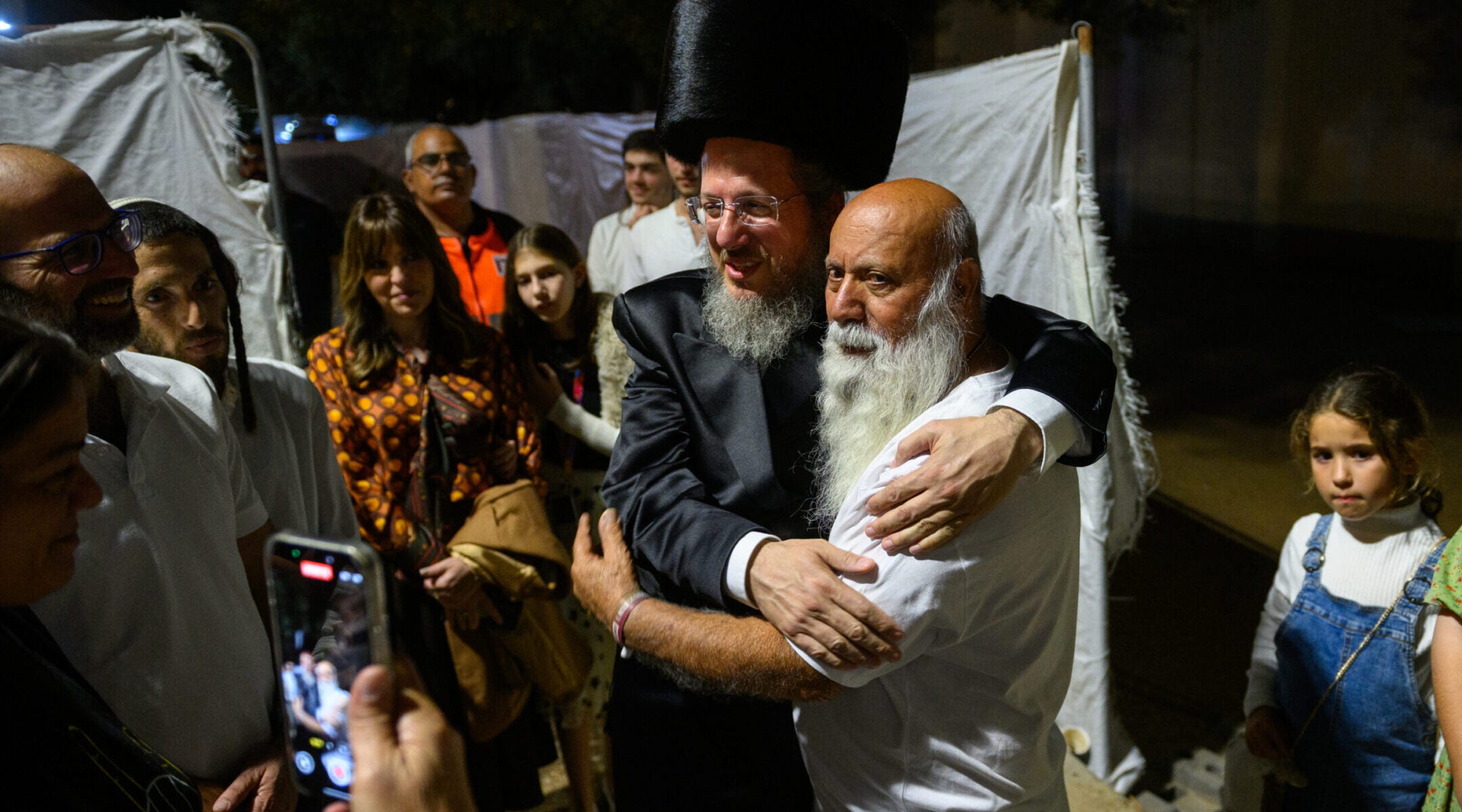
Rabbi Haim Eidelis, left, embraces Dani Miran, the father of released hostage Omri Miran during a celebration for Simchat Torah in Hostage Square in Tel Aviv, Oct. 14, 2025. (Alexi Rosenfeld/Getty Images)
Tel Aviv Deputy Mayor Chaim Goren said the event, organized annually by the municipality with Ma’ale Eliyahu Yeshiva and other national-religious groups, was originally meant to take place at a nearby plaza. “It felt detached to hold it there,” he said. The Hostages and Missing Families Forum agreed to move it to the square, though the decision wasn’t final until the last minute.
“There was back-and-forth until the holiday started about whether and how to do it,” Goren said. “With all the joy, there’s still a kvetch in the heart” — using the Yiddish word for ache — “but there’s also a deep need to give thanks to God for what we’ve witnessed.”
For Tel Aviv resident Sapir Barak, the night offered a release she hadn’t allowed herself since Oct. 7, 2023.
“When they announced the release yesterday, I basically had a nervous breakdown,” she said. “I was crying so much. There are so many emotions. It’s like a dream come true, but you don’t know what to do with it.”
Nearby, Henri Rosenberg cut an unusual figure in Hasidic garb with a fur shtreimel and a “Bring Them Home” dog tag around his neck, standing beside his grandson who wore a red MAGA baseball cap. But despite appearances, Rosenberg said he no longer identified as haredi Orthodox, having grown disillusioned by what he called indifference within some haredi circles to the pain felt by other Israelis during the war. Health problems had led him to attend a nearby national-religious synagogue over the High Holidays, where, he recalled, “the cantor wept for the hostages and the soldiers.”
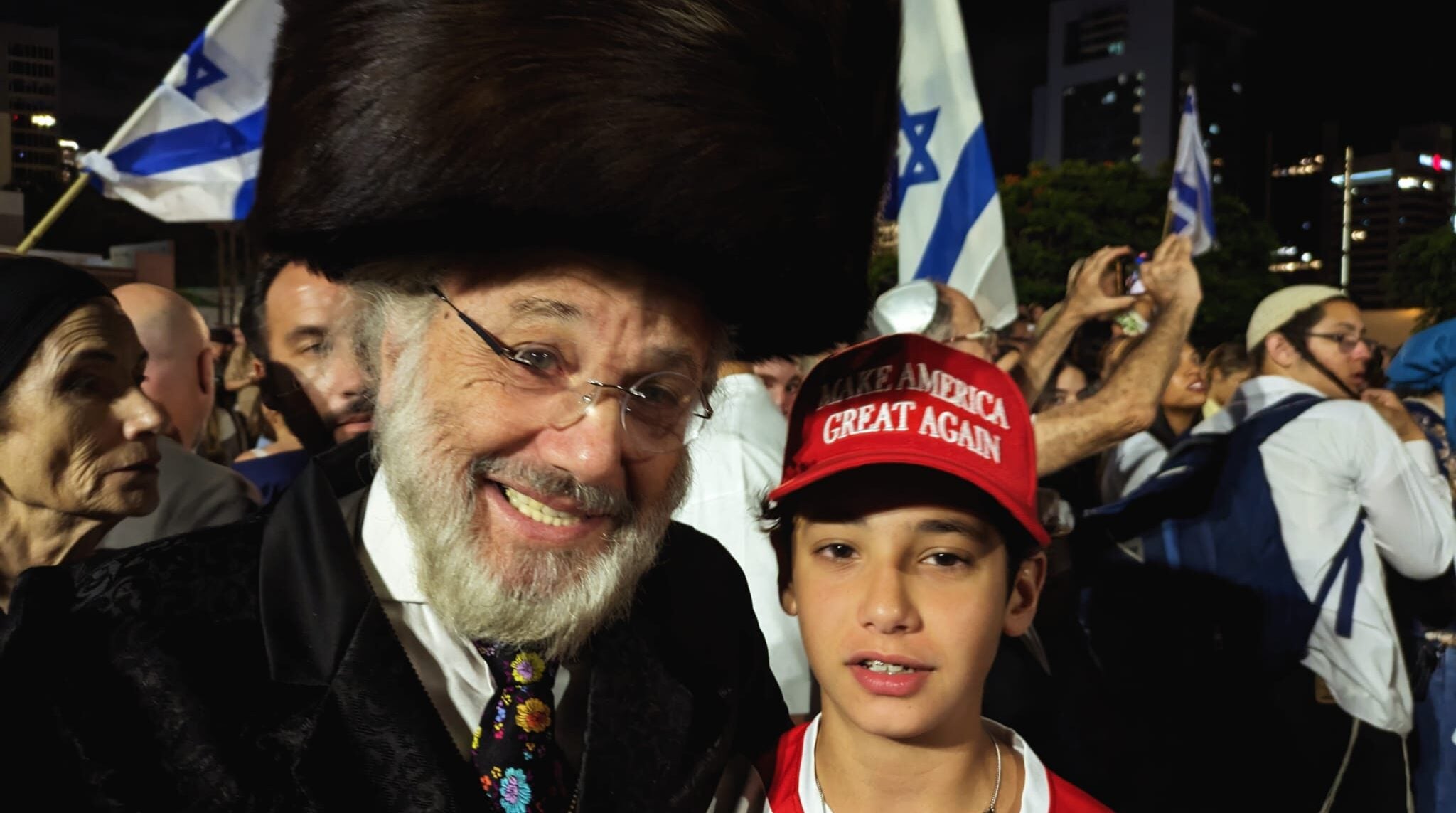
Henry Rosenberg, with his grandson, says he no longer identifies as haredi in the aftermath of Oct. 7, in Hostages Square in Tel Aviv, Oct. 24, 2025. (Deborah Danan)
“They are our flesh and blood, and that’s why I’m here tonight,” he said.
From the stage, Genia Erlich Zohar, aunt of American-Israeli hostage Omer Neutra — whose body remains in Gaza and who would have turned 24 on Tuesday — called on the crowd to respect the duality of the moment.
“We hold both joy for those who came home and hope and pain for those who haven’t,” she said. “We are one people, one heart.”
Miri Polachek, a friend of the Neutra family who has volunteered with relatives of the hostages, said she came to the event to support the Neutras and the other families. Recalling her own son’s playdates with Omer when they were children, she said, “It’s a never-ending reminder that it could have been any of our children.”
Among those on stage was Elkana Levy, a Golani Brigade officer who lost both legs in an explosion in Khan Younis. One of three brothers wounded in the Gaza war, he led a silent hakafa from his wheelchair and vowed that those “fighting day and night for the return of our brothers … would never break.”
At the edge of the square, a few dozen demonstrators held posters of those still in Gaza, chanting “Everyone, now!” — the familiar rallying cry for the hostages’ return.
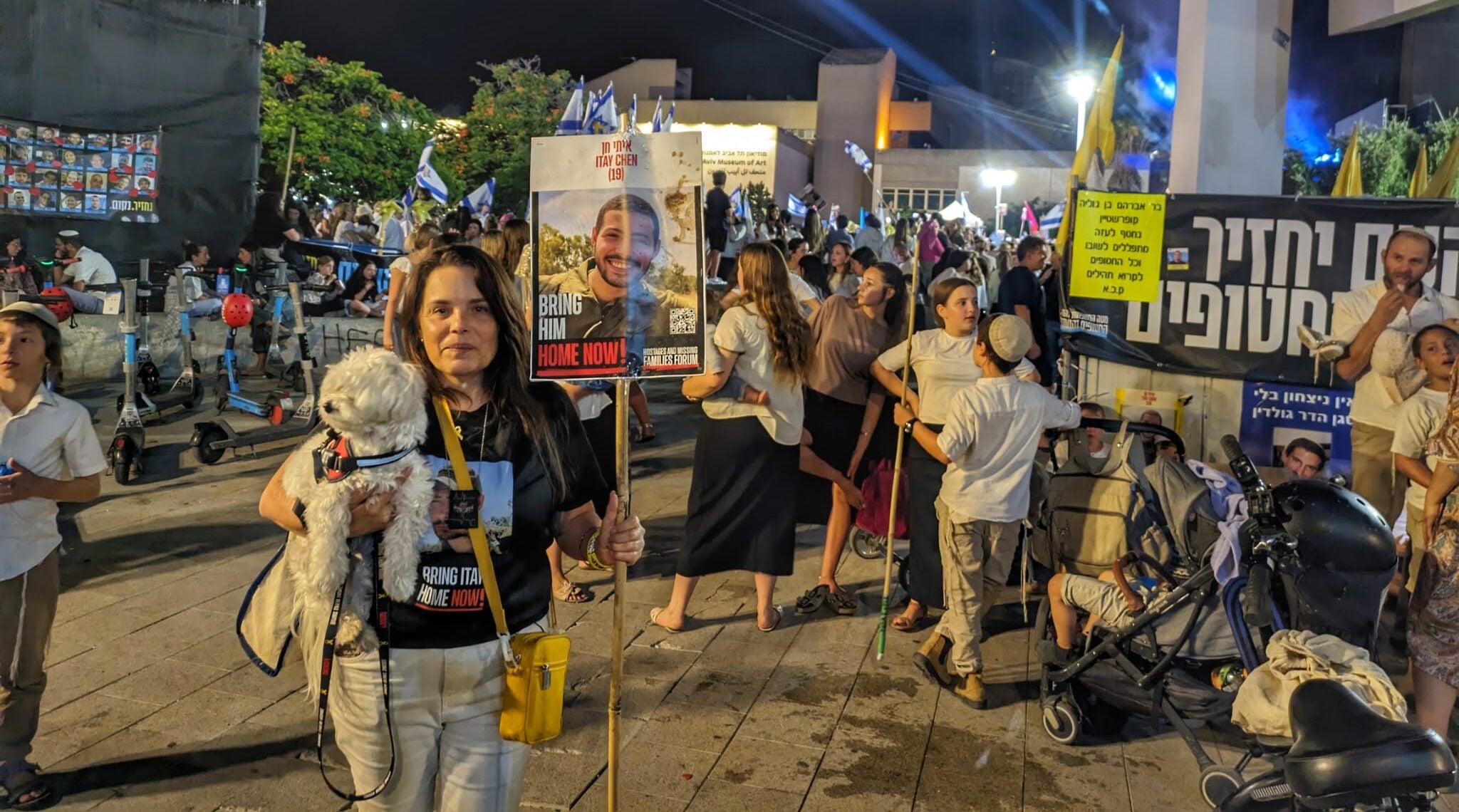
Hagit Chen, the mother of the deceased hostage Itay Chen, poses with his dog in Hostages Square after Simchat Torah in Tel Aviv, Oct. 14, 2025. (Deborah Danan)
Hagit Chen, holding “Gucci,” the small white dog that had belonged to her son, slain hostage and dual American-Israeli citizen Itay Chen, whose body has not yet been returned, called Monday’s release “a huge miracle,” even as she admitted her faith had been shaken.
“I was convinced Itay would be returning home yesterday with the others,” she said. Still, she added, the elation around her was not an affront. “I don’t look at joy that way. I embrace what’s happening here. We all need the strength it gives us.”
“But we cannot take our foot off the gas,” she said. “The deal is not a good one for the fallen hostages.” She pointed to what she described as the vague language of the Trump.-brokered agreement, which requires Hamas to make “all necessary efforts” to secure their release. “If we don’t see their return, it will be an open wound for all of us.”
Dani Miran, whose son Omri was among those freed on Monday, said Israel should halt the next stage of the deal until every hostage is accounted for.
“We should have resumed fighting at 1 p.m. yesterday, the moment we understood the 28 bodies weren’t coming home,” he said at Tel Aviv Sourasky Medical Center, where his son is receiving treatment. “[Hamas] will not understand anything else.”
Miran said he would remain in Tel Aviv, where he has lived since his son’s abduction, until the last hostage returns. He declined to say whether he would shave his long white beard, a vow he made to keep until Omri came home.
Activist and artist Hila Galilee, posed with Miran’s longtime partner, Galia Korel, while holding a mock yellow Torah scroll with images of the hostages. “The entire Torah is the hostages,” she said.
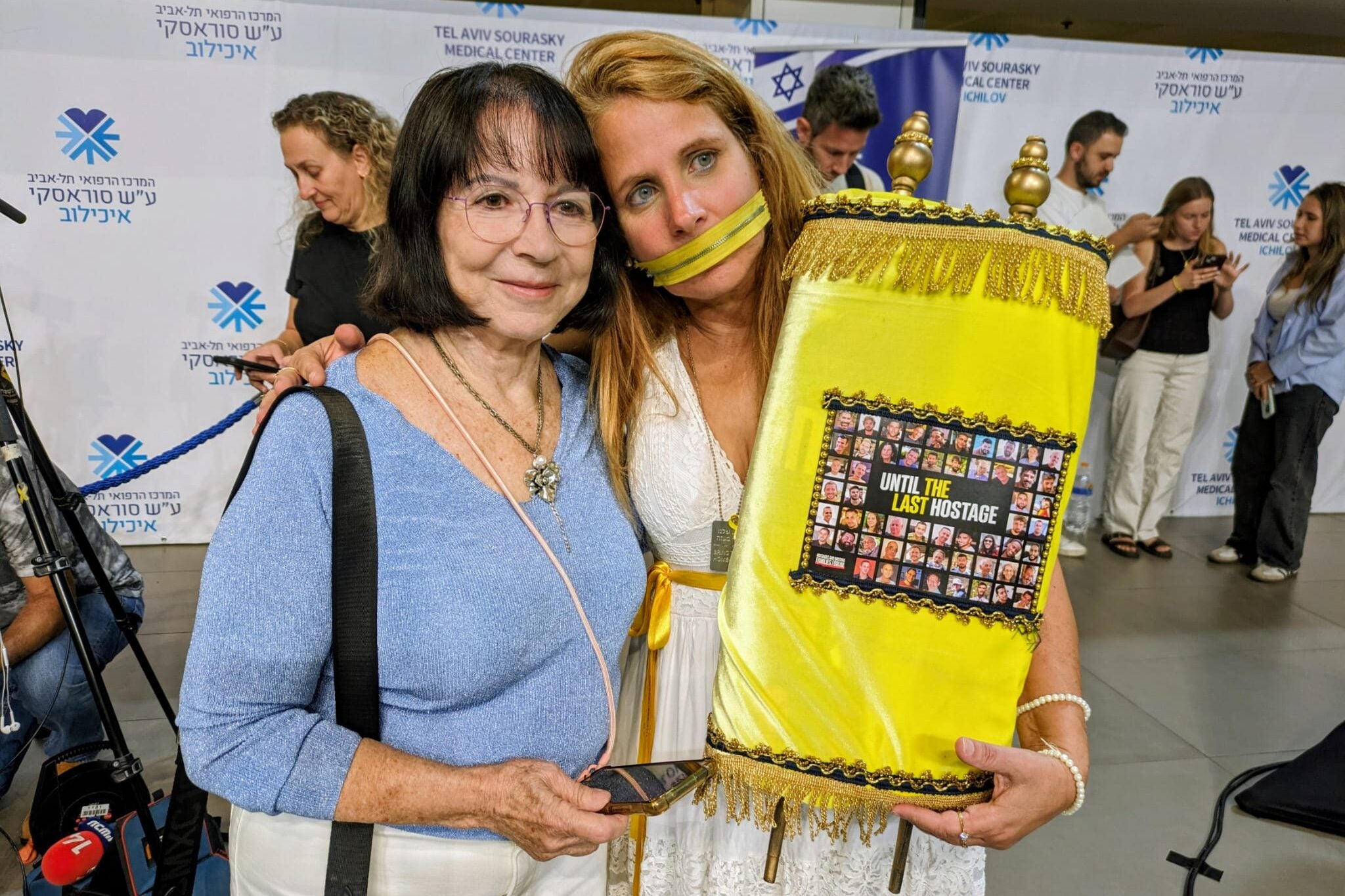
Galia Korel, left, and artist Hila Galilee pose in Tel Aviv with a Torah decorated with the faces of deceased hostages in Gaza, Oct. 14, 2025. (Deborah Danan)
The question of what to do with the hostages’ symbols no longer has a single answer. Romi Gonen was filmed with friends tearing off the tape marking the number of days the hostages have been held, cheering as they did. Rachel Goldberg-Polin, who began the tape tradition for her son, slain hostage Hersh, said on Wednesday that she would continue to wear hers.
Hagit and her husband, Ruby Chen, criticized Knesset Speaker Amir Ohana for removing his hostage pin during President Trump’s visit to the Knesset. “It isn’t over,” Chen addressed Ohana in a video posted to social media. “Put the pin back on until the last hostage is back.”
After Trump announced that the living hostages would be returning home, Miran urged Tel Aviv mayor Ron Huldai to rename the site Returnees’ Square. But Hagit Chen said in an interview on Tuesday night that the name Hostages Square should remain until all are home.
In the square, posters of freed hostages have been taken down, some replaced by new banners, including one with Trump’s words, “Now is the time for peace.” Other features remain unchanged, including the mock tunnel evoking the underground passages where many hostages were held in Gaza and the digital clock counting the days and seconds since the attacks.
Miran, who had walked the one block from the hospital to the square, led the crowd in a psalm of thanksgiving. “Secular, religious — I hate these distinctions. All I see from up here is Jews,” he said from the stage. “Let’s stay like this. The nation of Israel lives.”
Brown U’s Jewish president turns down Trump’s ‘Compact’ deal for campuses
A second university — like the first helmed by a Jewish woman — has rejected the Trump administration’s offer of special funding in exchange for an array of concessions.
Brown University’s president, Christina Paxson, announced the decision on Wednesday, releasing the letter she sent to Education Secretary Linda McMahon and her staff. In the letter, she explained that while Brown remains committed to the agreement it struck in June to restore $50 million in federal funding that had been frozen over allegations of antisemitism, she could not abide by the terms of the new deal, which the Trump administration is calling the “Compact.”
“While a number of provisions in the Compact reflect similar principles as the July agreement — as well as our own commitments to affordability and the free exchange of ideas — I am concerned that the Compact by its nature and by various provisions would restrict academic freedom and undermine the autonomy of Brown’s governance, critically compromising our ability to fulfill our mission,” Paxson wrote in the letter.
Brown follows the Massachusetts Institute of Technology in rejecting the deal, which would have required limits on employees’ political speech and “transforming or abolishing institutional units that purposefully punish, belittle, and even spark violence against conservative ideas.” The proposal reflects the Trump administration’s strategy of wielding federal funding as both a carrot and stick to pursue its ideological agenda.
Like MIT’s president, Sally Kornbluth, Paxson is Jewish and has cultivated the support of her campus’ Jewish community even amid concerns about the handling of pro-Palestinian student protests last year.
Paxson had not immediately rejected the deal the Trump administration had offered to nine schools that it said were “good actors,” instead saying that the decision would incorporate feedback from the Brown community. She said in an email to the community that thousands of people had responded.
Paxson drew criticism from some quarters last year after she announced that student advocates of divestment from Israel would be permitted to make their case before a vote by Brown’s board of trustees. The board then rejected divestment.
Seven universities, including both private colleges and public systems, have not yet responded to the Trump administration’s latest offer.
Trump on Mamdani: ‘He hates Jewish people and yet he’s got Jewish people supporting him’
This piece first ran as part of The Countdown, our daily newsletter rounding up all the developments in the New York City mayor’s race. Sign up here to get it in your inbox. There are 20 days to the election.
🔥Trump turns up the heat on Mamdani and NYC
- President Donald Trump renewed his attacks on Mamdani on Tuesday, calling him “down and dirty,” a “communist” and anti-Jewish.
-
“He hates Jewish people and yet he’s got Jewish people supporting him,” Trump said during a press conference with Argentinian President Javier Milei. A recent Marist poll showed Jewish voters evenly divided between Mamdani and Cuomo.
- Trump has regularly expressed disbelief that Jews would vote for Democrats or against him, given what he has argued is a clear track record of antisemitism on the left and his own support for Israel.
-
Trump didn’t have kind words for Mamdani’s opponents, either. He said the frontrunner’s victory would be “a fluke” because he was running against “failed people.”
-
Trump also reiterated his threats to cut New York’s federal funding and deploy federal troops to the city, as he did in Chicago and Washington, D.C., if Mamdani is elected.
-
Mamdani responded to the comments at an event in Brooklyn where he was endorsed by Black clergy leaders. “We will continue to receive funding from the federal government, and it’s not because of President Trump’s generosity. It’s because it is the law,” he said. Congress has the role of appropriating federal money that is distributed to states and cities.
🤝 Hochul teams up with Mamdani
- Gov. Kathy Hochul also snapped back at Trump’s threat to withhold funding. “I’ll fight like hell to make sure that doesn’t happen,” she said in her first appearance with Mamdani since she endorsed him last month.
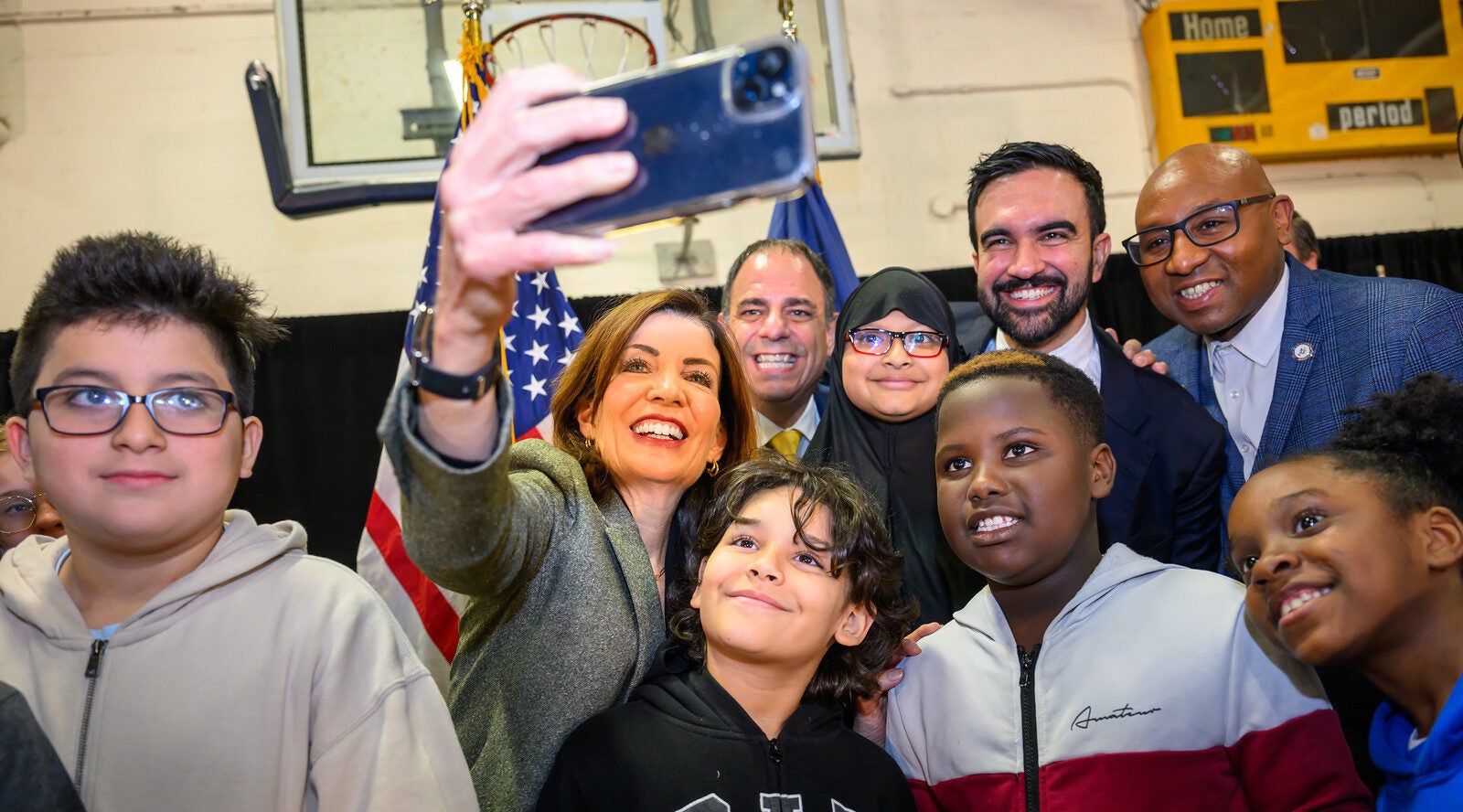
N.Y. Gov. Kathy Hochul announces $5 million in state funding to build a new Queens Boys & Girls Club Clubhouse in Astoria, Queens. (Susan Watts/Office of Governor Kathy Hochul)
-
Hochul and Mamdani weren’t together for a campaign event. They linked up at a Boys and Girls Club in Queens, where they announced funding for youth programs and affordable housing, and Mamdani appeared in his role as an Assembly member.
-
Hochul praised Mamdani’s focus on affordability and highlighted one area where she planned to cooperate with him. “I’ve had conversations with Assemblymember Mamdani about how we can get to universal child care. I believe we can,” she said.
📺 Sarah Sherman spoofs Mamdani critics on ‘SNL’
🎙Debate prep
- Thursday night’s debate is one of Cuomo’s last chances to make up his distance behind Mamdani. Despite a boost after incumbent Mayor Eric Adams quit the race, Cuomo still trails Mamdani by double digits in recent polling.
-
Cuomo has to rally moderate and conservative New Yorkers who would otherwise vote for Sliwa or stay home on Election Day.
-
Mamdani has to make sure he doesn’t mess up his lead. It’s rare for a debate to significantly change a race at this late stage — but it’s certainly possible.
War battered their Berlin hummus bar. But the Israeli-Palestinian partners behind Kanaan see a way forward.
BERLIN — At a hummus restaurant in Berlin’s leafy neighborhood of Prenzlauer Berg, war has come knocking many times over the last two years. Recently, it came with the threat of closure.
Jalil Dabit, a Palestinian, and Oz Ben David, an Israeli, have run the business together for 10 years. The last two saw Hamas’ Oct. 7 attack on Israel and the devastating war that ensued in Gaza, killing tens of thousands of Palestinians and largely reducing the enclave to rubble.
Dabit and Ben David named their restaurant Kanaan — a Hebrew and Arabic word for the ancient land they both call home, before it was known as Israel or Palestine.
They have a mission beyond bringing the best hummus to Berlin. They turned Kanaan into a local symbol of Israeli-Palestinian dialogue, organizing free programs that teach about cooking and prejudice. One project joined Palestinian refugees who fled Gaza during the war together with members of Berlin’s Israeli community to cook under one roof. A rainbow sign outside the restaurant reads, “Make hummus not war.”
But in August, the partners issued an emergency plea.
“Kanaan is facing closure,” they announced to customers. “The year 2025 was tough. War, economic uncertainty and a sharp drop in revenue have brought us to a point where we cannot continue without your help. If nothing changes in the next two weeks, we will have to close Kanaan.”
Dabit and Ben David have continuously fended off the Gaza war’s encroachment on their business. On Oct. 7, 2023, they closed for six days. Ben David said he felt driven to quit after his friend was killed and his family members hid in their safe room from the Hamas attack on Kibbutz Be’eri. Dabit coaxed him back from despair.
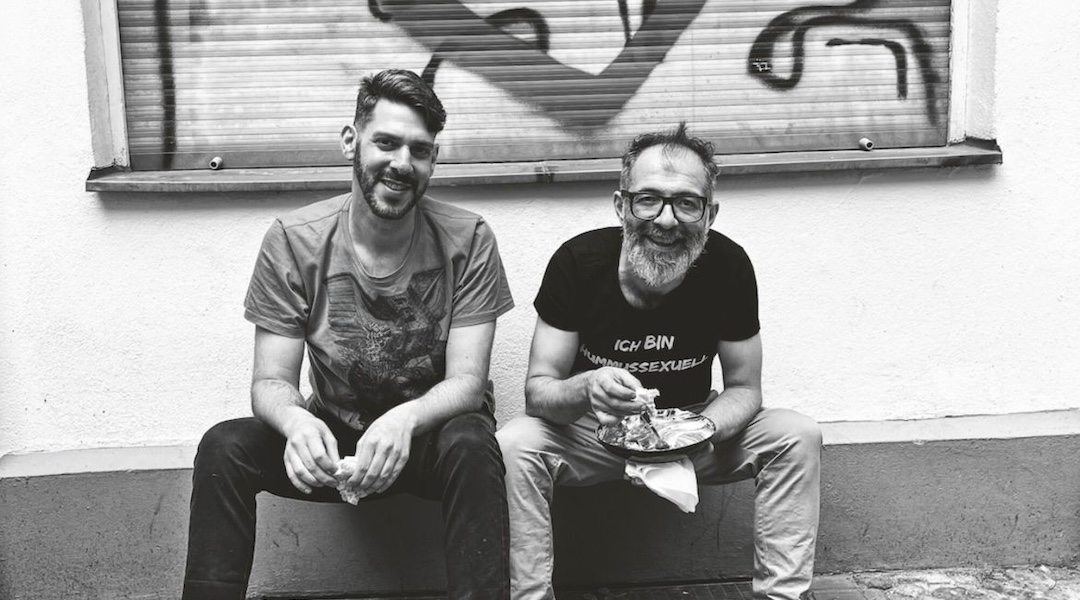
Jalil Dabit, right, wears a shirt that translates to “I am a hummussexual.” He and Oz Ben David opened Kanaan in 2015. (Elisabeth Patrikiou)
The unlikely duo supported each other even as their message cost them Israeli and Palestinian friends from home. Ben David grew up in Ariel, an Israeli settlement in the West Bank; Dabit comes from Ramle, a mixed city in central Israel where his family has lived for hundreds of years. He had 16 family members in Gaza when the war broke out, all of whom since escaped to Australia.
In Berlin, their restaurant has been tested by tensions over the war. Both far-right and far-left factions have protested the “normalization” of an Israeli and a Palestinian working together.
In July 2024, Kanaan was vandalized after hosting a Jewish-Muslim brunch. The attackers shattered wine glasses, destroyed furniture, spread excrement and left hate messages throughout the restaurant. With nothing stolen, police suspected the vandalism to be motivated by hate. Months later, an Israeli woman was assaulted by four people while wearing Kanaan’s signature pin, which depicts a heart divided between the Israeli and Palestinian flag. One of the attackers shouted “Israel muss weg,” or “Israel must go,” while they knocked the woman to the ground and kicked her.
More recently, Ben David said they faced a downturn in revenue. Their customers were dwindling and they struggled to keep up with rising costs and high rent. He reached out to an email list of previously loyal customers, asking for feedback about why they weren’t returning. The responses weren’t about the food.
One answer came back clearly: People couldn’t figure out how to place Kanaan’s message of dialogue and coexistence. “‘We don’t understand if you are pro-Israel or pro-Palestine.’ That’s something that we heard a lot,” said Ben David.
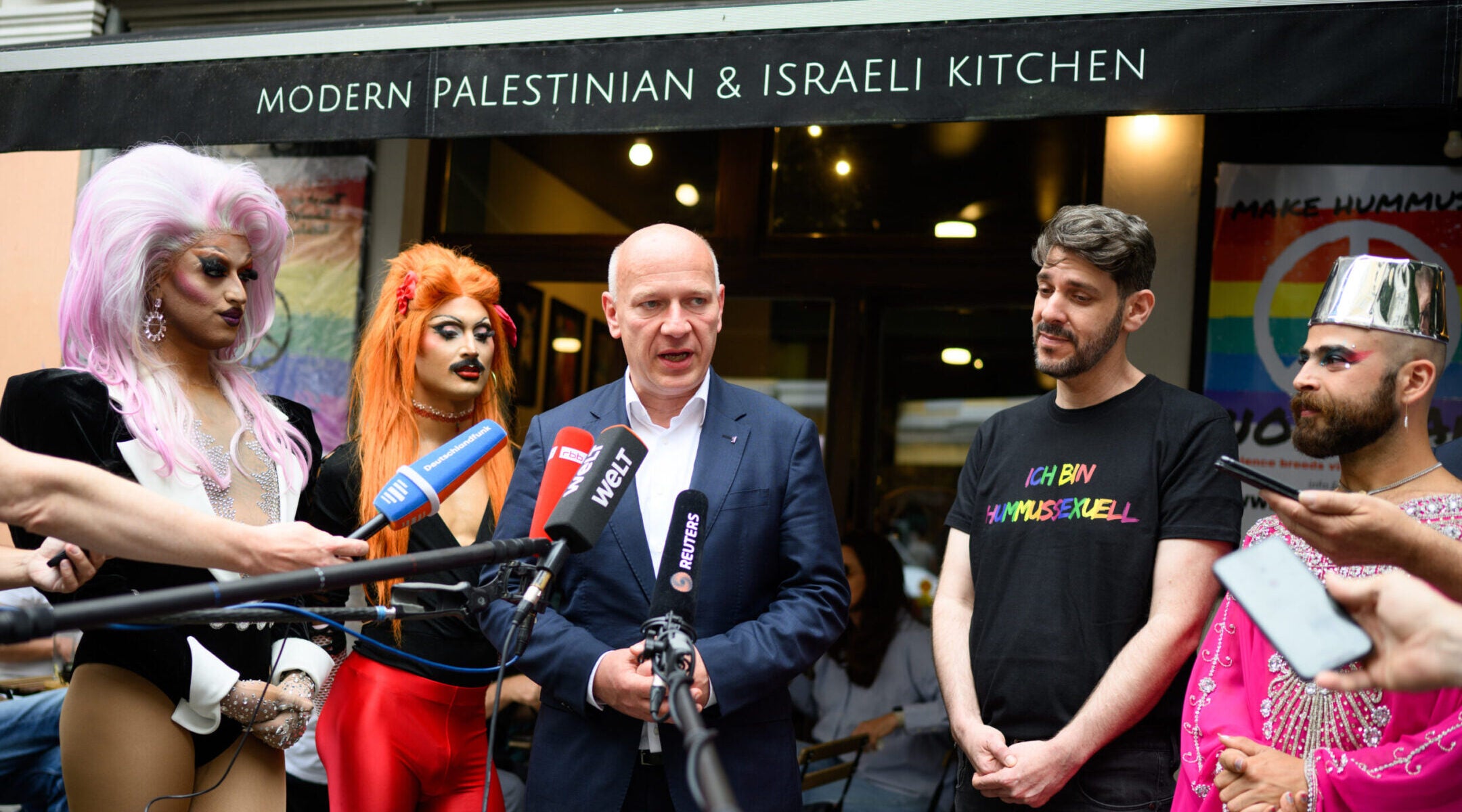
Berlin Mayor Kai Wegner visits Kanaan following a break-in and vandalism at the Israeli-Palestinian restaurant, July 26, 2024. (Bernd von Jutrczenka/picture alliance via Getty Images)
Another response came down to fatigue with the Israeli-Palestinian conflict. After reading and watching news about the war for two years, when they finally had a break, many customers said they’d rather go out for sushi or Italian food.
Two weeks from bankruptcy, Ben David and Dabit tried to explain the restaurant’s significance to their community. “Kanaan was never just a restaurant,” they wrote on social media. “It’s a place where Israelis and Palestinians work together, where all guests eat together, where food is more than just enjoyment. … It’s a bridge between people.”
The following weeks saw a stunning change in fortune. Kanaan filled up again with a 300% increase in diners. Catering orders poured in, while many customers bought vouchers for the future. The support wasn’t just financial, said Dabit.
“When people react to our call, they give me — not just Kanaan, but also Oz and me — they give us the energy to continue,” he said. “They show us that we’re doing something right, even though it’s a really bad situation, but we’re doing something right.”
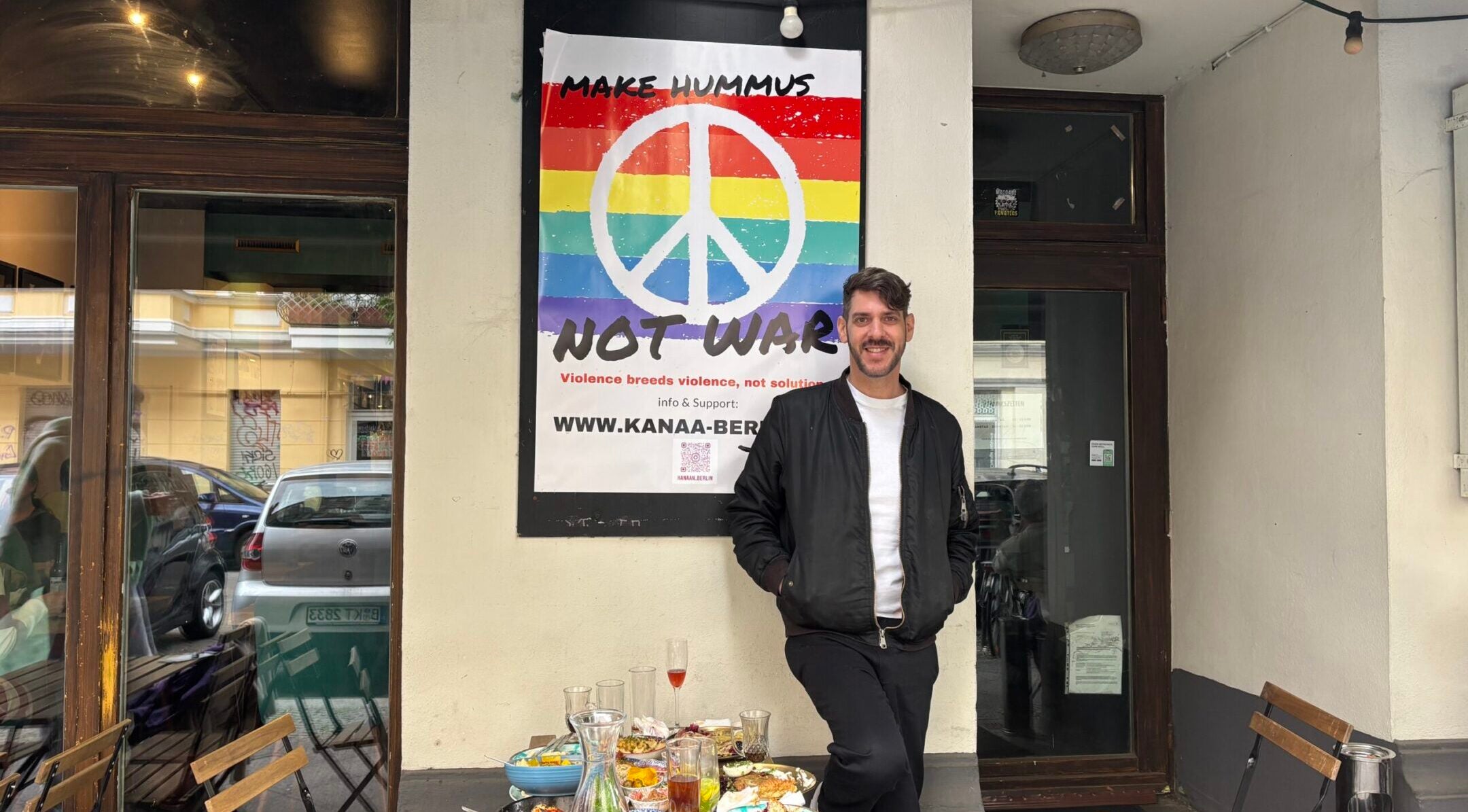
Oz Ben David poses outside the restaurant he owns with Jalil Dabit in Berlin, August 2025. (Shira Li Bartov)
For now, the restaurant can keep going. And the partners have new inspiration for their persistent hope: Back home, the first phase of a ceasefire agreement between Israel and Hamas saw the last 20 surviving Israeli hostages returned in exchange for 1,968 Palestinian prisoners on Monday, as scenes of ecstatic reunions and continued grief washed over Israel, Gaza and the West Bank.
Dabit and Ben David said they were filled with joy and relief, mixed with yearning for a lasting peace and reconciliation.
“The ceasefire feels like a breath of fresh air after so much suffering,” said Dabit. “It’s bittersweet, but it’s an opportunity for change. This is our chance to write a new narrative for our future.”
In Kanaan’s backyard, the Gaza war triggered a sharp rise in antisemitic and anti-Muslim incidents across Germany. It also drove a fraught debate over Germany’s relationship with Israel, which became central to German national identity after the Holocaust. Unlike other European countries that have recently recognized a Palestinian state, including the United Kingdom, France, Belgium, Portugal and Spain, Germany has declined to do so.
Pro-Palestinian protests in Berlin have also led to government crackdowns. In April, German immigration authorities ordered the deportation of three European nationals and one U.S. citizen over their alleged activity at pro-Palestinian demonstrations. Three of the orders cited Germany’s responsibility toward Israel — a doctrine known as the country’s “Staatsräson,” or “reason of state.” (All the protesters have appealed and won measures for interim relief.)
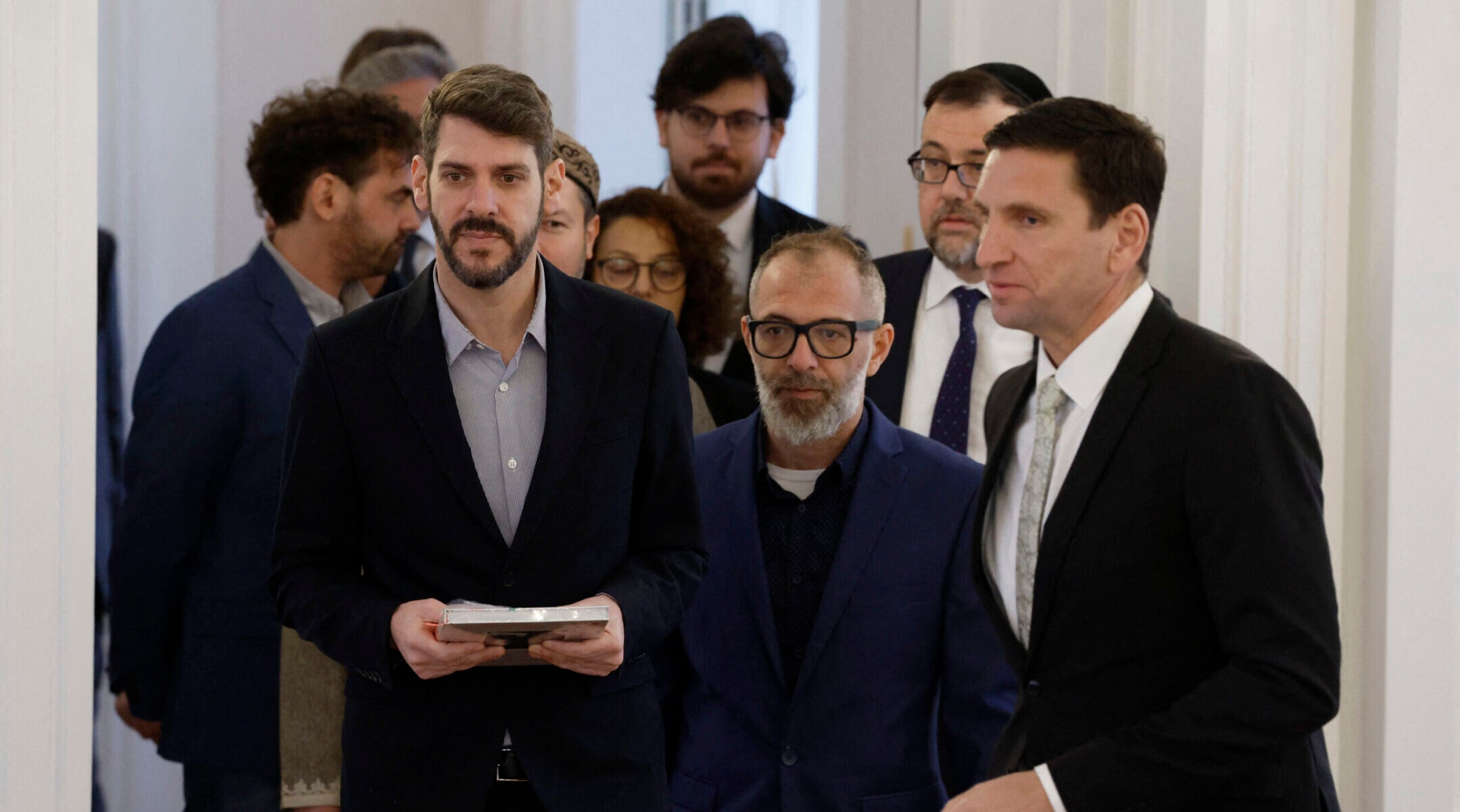
Oz Ben David, at left, and Jalil Dabit, center, co-owners of the Israeli-Palestinian restaurant Kanaan in Berlin arrive for talks titled “War in the Middle East: For a peaceful life together in Germany,” at the presidential Bellevue Palace in Berlin, Nov. 8, 2023. (Odd Anderson / AFP via Getty Images)
Dabit and Ben David plan to shape the conversations about Israelis, Palestinians, Jews and Muslims in Germany through projects beyond their restaurant. On Nov. 5, they will publish a cookbook titled “Kochen ohne Grenzen,” or “Cooking Without Borders.” The book collects their recipes while also sharing their kitchen with Berliners from around the world — including rabbis, imams and priests who cook together.
During a recent phone call between Dabit in Ramle and Ben David in Berlin, they jokingly interrupted each other’s stories about their families with accusations of “propaganda.” Turning serious, Dabit said, “I’m optimistic because I see the beauty of every person. If I couldn’t see the beauty, I couldn’t be with you for 10 years, Oz.”
“That’s true,” replied Ben David. “You managed to take a settler from Ariel and make him your best friend, like your brother.”
3 more hostages’ remains returned as Hamas reasserts control in Gaza, potentially threatening truce
Israel has identified the remains of three more hostages following a second release by Hamas on Tuesday, bringing the number of deceased hostages in Gaza to 21.
But even as the conditions of the first phase of the ceasefire agreement were still being met, both President Donald Trump and Israeli Prime Minister Benjamin Netanyahu indicated that further fighting could be in the future if Hamas does not move forward with disarming — as footage from Gaza shows it is far from doing.
The three hostages whose remains were returned were Uriel Baruch, Eitan Levy and Tamir Nimrodi. Nimrodi’s death had not previously been confirmed, though Israeli authorities said there was “grave concern” about his condition. The Hostages and Missing Families Forum said he had been abducted alive but was subsequently killed in an Israeli airstrike.
A fourth set of remains sent to Israel was not that of a hostage and likely came from a Gazan, officials said DNA analysis showed.
More remains could be released on Wednesday as Hamas faces calls to hold up its end of the deal struck last week, which required the return of all 48 Israeli hostages. All 20 living hostages and four deceased hostages were released on Monday.
U.S. President Donald Trump, who pressed for the deal, called attention to Hamas’ delay in returning the deceased hostages in a post on Truth Social on Tuesday. But he also said that the second phase of the ceasefire, in which a lasting peace and plan for Gaza’s future governance is supposed to be negotiated following the release of all hostages, was already underway.
“ALL TWENTY HOSTAGES ARE BACK AND FEELING AS GOOD AS CAN BE EXPECTED. A big burden has been lifted, but the job IS NOT DONE,” Trump wrote. “THE DEAD HAVE NOT BEEN RETURNED, AS PROMISED! Phase Two begins right NOW!!!”
Meanwhile, footage showed Hamas operatives emerging from hiding in Gaza and reasserting themselves in the enclave, including by executing those seen as having opposed Hamas during the war with Israel.
Trump’s peace proposal called for Hamas to disarm and not play a role in governing Gaza, but the group has not agreed to those terms. Trump said before traveling to Israel on Monday that Hamas had been given temporary approval to act as a police force in Gaza.
“Well, they are standing because they do want to stop the problems, and they’ve been open about it, and we gave them approval for a period of time,” he told reporters.
On Tuesday, he said the show of force “didn’t bother me much, to be honest with you,” because the group had targeted rivals “that were very bad.”
But both Trump and Israeli Prime Minister Benjamin Netanyahu indicated that a long-term failure to demilitarize by Hamas could risk a return to fighting.
“They’re going to disarm, and because they said they were going to disarm. And if they don’t disarm, we will disarm them,” Trump told reporters at the White House on Tuesday. He was then pressed on how he knew the group would do something it has said it would not do.
“I don’t have to explain that to you, but if they don’t disarm, we will disarm them. They know I’m not playing games,” Trump said. “If they don’t disarm, we will disarm them, and it’ll happen quickly and perhaps violently. But they will disarm.”
Netanyahu told CBS News that he understood Trump’s comments to be a version of the threats Trump made on social media that coincided with a ceasefire deal moving forward: Disarm or “all hell breaks loose,” Netanyahu said.
The Israeli prime minister said he hoped it would not come to that. “We agreed to give peace a chance,” Netanyahu said, adding, “I hope we can do this peacefully. We’re certainly ready to do so.”
How NYC mayoral candidates reacted to the release of the Israeli hostages, from Gematria to Gaza
This piece first ran as part of The Countdown, our daily newsletter rounding up all the developments in the New York City mayor’s race. Sign up here to get it in your inbox. There are 21 days to the election.
🕯 From Gematria to Gaza
- Andrew Cuomo, Curtis Sliwa and Zohran Mamdani reacted Monday to the release of the last 20 living Israeli hostages in exchange for nearly 2,000 Palestinian prisoners.
-
Cuomo called it a “moral moment” and invoked the Holocaust commemoration slogan “never again” to condemn the Hamas attacks. He also quoted writer and Holocaust survivor Elie Wiesel as saying, “The opposite of love is not hate, it’s indifference.”
-
Sliwa introduced Jewish math into his statement, leaning on a Kabbalistic system known as Gematria. “The 20 surviving hostages are reunited by families and loved ones after 738 agonizing days in captivity. 7+3+8 = 18, which means Chai, which means ‘life’ in Judaism,” he said.
-
Mamdani said the “scenes of Israelis and Palestinians are profoundly moving,” but focused much of his statement on holding the Israeli and U.S. governments accountable for the death and destruction in Gaza. He also repeated his stance that American tax dollars “funded a genocide” in Gaza and that the global community must work toward a future “without occupation and apartheid.”
-
Mamdani posted his statement at 4:20 p.m. New York time, over 12 hours after the hostage release, leaving time for Cuomo to criticize him.
-
“It shouldn’t go unnoticed that @ZohrankMamdani – who still refuses to condemn the phrase ‘globalize the intifada’ (widely understood to mean death to Jews) – has yet to comment on the release of the hostages. His silence speaks volumes,” Cuomo said on X.
-
In a race where Cuomo and Mamdani have sparred over their ability to stand up to President Donald Trump, neither mentioned his name or role in brokering the ceasefire. Sliwa said he was “proud of President Trump and all involved.”
🌹 Mamdani’s charm offensive
- Mamdani is continuing his charm offensive with New York’s business elite, reported The New York Times. He has built relationships with some of his harshest skeptics, and many say they like him — even if they disagree with his stances and plan to vote for Cuomo.
-
Mamdani has strongly pivoted his views on policing, one of the top concerns among critics who recall his “defund the police” calls in 2020. In addition to a private apology tour with police officers, he has reiterated his interest in keeping Police Commissioner Jessica Tisch in her role, according to The New York Times Magazine.
-
But Mamdani isn’t budging on his Israel views, he told the magazine. He reaffirmed his commitment to ordering the arrest of Israeli Prime Minister Benjamin Netanyahu if he is elected mayor, though the pledge is unpopular even among some of his allies.
🎤 A Jewish comic stumps for Mamdani
- Jewish comedian Gianmarco Soresi, who recently told us about his Jewish background, which figures prominently in his act, was among the speakers at Mamdani’s rally in Washington Heights on Monday night, according to Politico.
-
At the rally, which drew some 3,000 supporters, Mamdani said he saw “power of a movement that won the battle over the soul of the Democratic Party.”
-
“We all know Cuomo will kiss the ring” of Trump, Soresi joked. “He kisses everything.”
-
Like Mamdani, Soresi is an outspoken critic of Israel and its actions in Gaza.
🗓 Coming up over the next three weeks
- Thursday is the first general election debate among Cuomo, Mamdani and Sliwa. The event will be held at 7 p.m. in Rockefeller Center, and you can watch live on WNBC-TV or across WNBC’s and WNJU-TV’s digital and streaming platforms.
-
Saturday, Oct. 25 is the last day to register to vote in person or by mail for the general election.
-
Saturday, Oct. 25 through Sunday, Nov. 2 are the dates for early voting.
-
Tuesday, Nov. 4 is Election Day.











